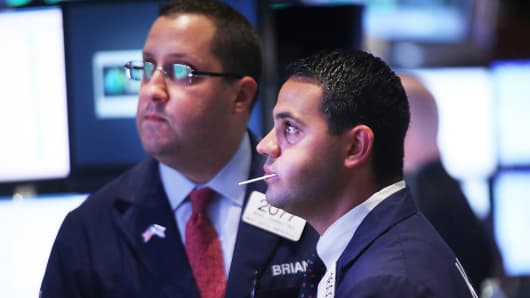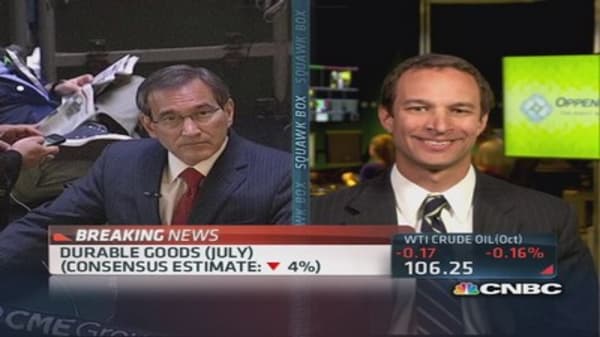West Texas Intermediate crude rose back above $106 per barrel in the late electronic session, after trading below that level during the trading day on word that Libya resumed exports from a terminal that had been closed. Oil settled at $105.92 on the Nymex.
"I think there's going to be a building up of the security premium. The rhetoric is going to start to fly," said John Kilduff of Again Capital. "I think this will be enough to get us through $108/109 resistance. I'm looking for it to get up to around $112/115."
(Read more: Economists: Future deficits top US fiscal problem)
Kilduff said while Syria is not a major oil exporter, its location is key. "It's clearly become a proxy war for almost the whole region," he said. "What's happening is you have Egypt and Syria that are not oil producers…You have a tight market and two significant flash points, and it keeps getting undermined by things like the problems with the Libyan oil, the lack of Iranian oil."
Gold prices began to rise while Kerry was speaking, and crossed above $1400 in late trading. Earlier in the day, gold touched $1400 for the first time in 11 weeks.
"What I call a small fear premium suddenly appeared," said George Gero, analyst with RBC, of the move higher in gold. Gero said gold has been rising on concerns about the Middle East but also on other reasons, including recent speculation the Fed may not pare back on its bond buying program when it meets Sept. 18 because of weaker data.
(Read more: US durable goods plunge in July, cash shadow over Q3)
The Dow fell 64 points to 14,946, and the S&P 500 dropped 6 to 1656. The Nasdaq, the only one of the three major indexes to be positive for the month, dropped less than a point to 3657. The Nasdaq is 0.9 percent higher for the month, while the Dow is down 3.6 percent and the S&P is down 1.7 percent.
Bonds were bid slightly higher on the Syria move, and the yield on the 10-year moved down to 2.79 percent in an inverse move to prices.
Besides the economic reports, traders are expected to watch San Francisco Fed President John Williams, who speaks at 6:50 a.m. ET in Sweden.
(Read more: Central banks told to cooperate on managing global liquidity)
Treasury Secretary Jack Lew speaks with CNBC's John Harwood on "Squawk Box" at 7:30 a.m. The Treasury Department said the debt ceiling would be hit in mid-October.
The Treasury auctions $24 billion in 2-year notes at 1 p.m. ET.
Companies reporting earnings Tuesday morning include Tiffany, DSW, Bank of Montreal and Bank of Nova Scotia. Avago and Tivo report after the close.
—By CNBC's Patti Domm. Follow here on Twitter @pattidomm.





